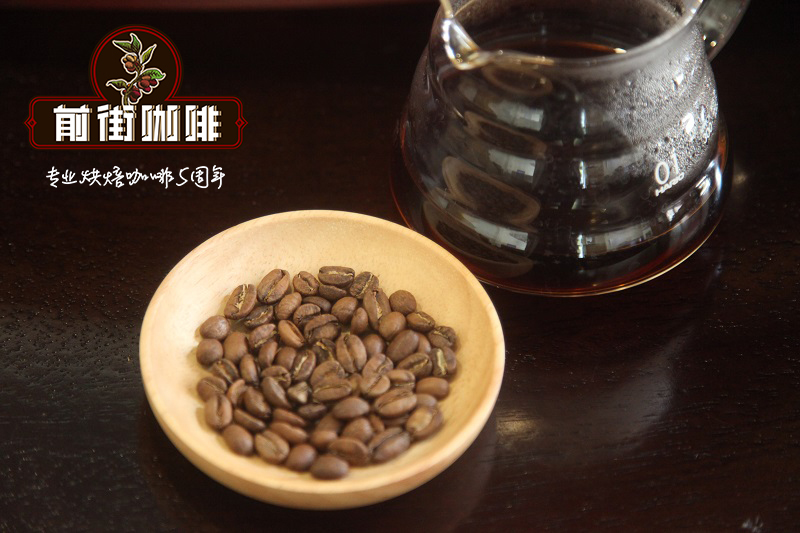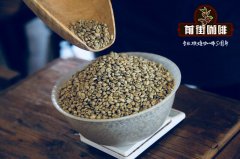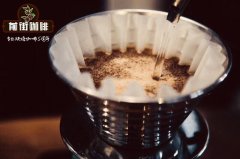Introduction of coffee beans in southern Laos dao coffee introduces the flavor characteristics of coffee beans in Laos

Professional coffee knowledge exchange more coffee bean information please follow the coffee workshop (Wechat official account cafe_style)
Laos, Southeast Asia's only landlocked country, has played an important role in the Golden Triangle drug trade over the past few decades. To help Laos get rid of opium poppy cultivation, the United Nations Office on drugs and Crime has launched a coffee bean cultivation program in 10 villages that used to grow opium poppy in Wapan province near the border with Vietnam.
The fertile plateau soil and cool climate of Huapan Province are suitable for the growth of opium poppy, the main raw material of opium, and for the cultivation of coffee beans. The United Nations hopes that the Laos coffee bean planting program will not only help the local production of Lao coffee beans, but also hope to further develop it into a "luxury" coffee brand that can be exported to rich markets in South Korea, Japan and even as far away as the United States.
Opium poppy cultivation in Laos is estimated to be about 5700 hectares in 2015, more than triple the number in 2007. Vietnam has crushed a number of major cases of raw opium and heroin smuggling this year, with arrested smugglers from the most marginalized ethnic group in Laos, the Hmong.
Farhi, a member of the United Nations Office on drugs and Crime, said: "these farmers come from the poorest areas of Laos, they can grow only crops of low economic value, and their opportunities to develop new markets and access to science and technology are also very limited. They want to get out of poverty, but they are desperate. "
Laos _ Dilta Coffee Manor AA selected Champion beans (half pound)
Lao DELTA AA
One of the 12 best kinds of coffee in the world
The history of Lao coffee can be traced back to the early 20th century. French colonial rule introduced coffee beans into Laos. Many experts have been sent to assist Lao farmers to improve the planting and baking technology of Lao coffee beans, thus creating the world-famous Lao coffee today. Arabica coffee in Laos is one of the 12 best kinds of coffee in the world. Alan, the owner of the coffee farm run by DELTA Manor in love, donates its revenue to Hope Primary School. The Europeans buy 30% of the revenue from all the raw coffee beans in the manor and give it back to the local public welfare.
Insisting on using natural and organic composting to irrigate his coffee trees, coupled with the huge and full coffee cherries produced by the volcanic geology unique to the Lao bolov plateau of Laos, it is a loving coffee grown by people who are absolutely enthusiastic about this land.
Mosuva, a Hmong farmer, said that in the past, he had no choice but to grow opium poppy, but in fact he earned very little money from growing opium poppy. Now he has changed to grow coffee beans and expects a harvest by the end of the year.
Opium poppy cultivation is believed to lose its economic value sooner or later, and what Laos really urgently needs to solve is the problem of methamphetamine trafficking. Laos, which borders Myanmar, Thailand, Vietnam, China and Cambodia, has an unguarded border and is now a conduit for Burmese drug lords, with methamphetamine and yaba exported from Myanmar to record highs.
Kong Weiyingtong pointed out that only two of the many border checkpoints in Laos are equipped with scanners and X-ray machines, and the resources of the police are far less than those of drug trafficking syndicates with modern means of transport and advanced communications equipment.
Laos is currently working with neighboring countries to combat drug trafficking syndicates by sharing intelligence. Xaysana Keophimpa, a Lao drug lord nicknamed "Mr. X", was sentenced to life in prison in Thailand this year, a major victory in the anti-drug effort.
However, there are still "big fish" at large. In January, the US Treasury imposed sanctions on Zhao Wei, a Chinese businessman, on suspicion of running a huge transnational criminal organization through the kapok casino in Laos special economic zone, engaged in human trafficking, wildlife and drug smuggling. The tentacles of the law cannot be extended to the special economic zones. Zhao Wei's 1999 lease with the Lao authorities allows him to set up his own security forces in the special economic zones, and the authorities cannot interfere.
Important Notice :
前街咖啡 FrontStreet Coffee has moved to new addredd:
FrontStreet Coffee Address: 315,Donghua East Road,GuangZhou
Tel:020 38364473
- Prev

Processing procedure of African coffee beans Flavor distribution and characteristics of African coffee beans
Professional coffee knowledge exchange more coffee bean information please follow the coffee workshop (Wechat official account cafe_style) coffee bean species regional analysis of coffee production areas in the world south of the equator, north of the area, also known as coffee belt, between the coffee belt production of more than 10 kinds of coffee beans, but at present the most common species of coffee beans, only Arabica
- Next

The original taste of Jamaican Blue Mountain Coffee is authentic. What are the characteristics of Jamaican coffee taste?
For more information on coffee beans, please follow Coffee Workshop (Wechat official account cafe_style) [History of Jamaican Coffee Blue Mountain Coffee] in 1717 King Louis XV of France ordered coffee to be grown in Jamaica, and in the mid-twenties, the Governor of Jamaica, Nicholas. Sir Nicholas Lawes imports from Martinique
Related
- Beginners will see the "Coffee pull flower" guide!
- What is the difference between ice blog purified milk and ordinary milk coffee?
- Why is the Philippines the largest producer of crops in Liberia?
- For coffee extraction, should the fine powder be retained?
- How does extracted espresso fill pressed powder? How much strength does it take to press the powder?
- How to make jasmine cold extract coffee? Is the jasmine + latte good?
- Will this little toy really make the coffee taste better? How does Lily Drip affect coffee extraction?
- Will the action of slapping the filter cup also affect coffee extraction?
- What's the difference between powder-to-water ratio and powder-to-liquid ratio?
- What is the Ethiopian local species? What does it have to do with Heirloom native species?

